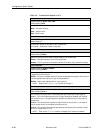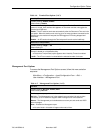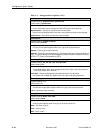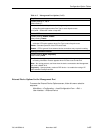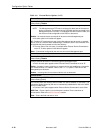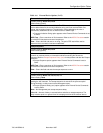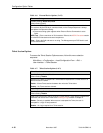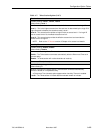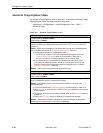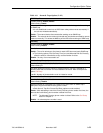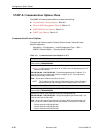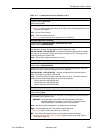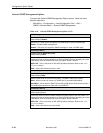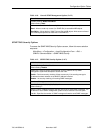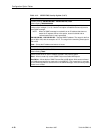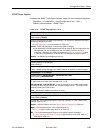
Configuration Option Tables
A-20
7610-A2-GB20-10November 1997
Alarms & Traps Options Menu
For Alarms & Traps Options, refer to Table A-8. To access the Alarms & Traps
Options screen, follow this menu selection sequence:
Main Menu
→
Configuration
→
Load Configuration From
→
Edit
→
Alarms & Traps
Table A-8. Alarms & Traps Options (1 of 2)
ASCII Alarm Messages
Possible Settings: Enable, Disable
Default Setting: Disable
Controls the generation and routing of ASCII alarm messages to an ASCII terminal or
printer connected to the Management port. Refer to the
Alarm Messages
section of
Chapter 8.
Enable – ASCII alarm messages are generated and sent out when the Management
port is configured for Alarms in Management Port Options, Table A-5.
H The messages are sent out immediately if there is:
– No DCE (e.g., modem or PAD) connected to the Management port and
External Device Commands option is set to Disable in Table A-6 or
– An active connection is already established via an external DCE.
H If an external device is connected to the Management port with no active
connection, the message control is based on the next option, Alarm & Trap
Dial-Out. External Device Commands must be configured for AT or Other in
External Device Options, Table A-6.
Disable – ASCII alarm messages are not generated or sent.
Alarm & Trap Dial-Out
Possible Settings: Enable, Disable
Default Setting: Disable
When there is no active connection, this option controls whether generating an ASCII
alarm or SNMP trap results in automatic call initiation.
Enable – Automatically places a call via the external device connected to the
Management port.
H To send out SNMP traps, SNMP Management must be enabled in Table A-10.
H When Port Use is set to Net Link in Table A-5, up to ten SNMP traps are queued
at the interface.
H The Primary Directory phone number is dialed. Refer to the
Call Setup
section of
Chapter 3.
H Refer to the Call Retry option for handling of incomplete call attempts.
Disable – Automatic call initiation is disabled and alarm messages are discarded.
SNMP traps are retained until a connection is established.



